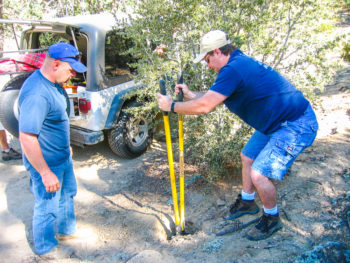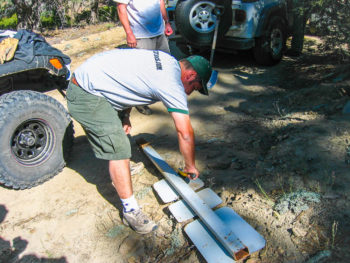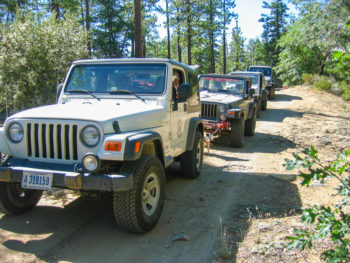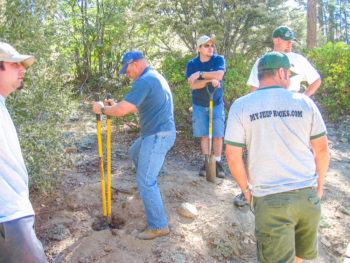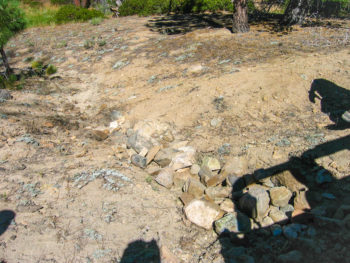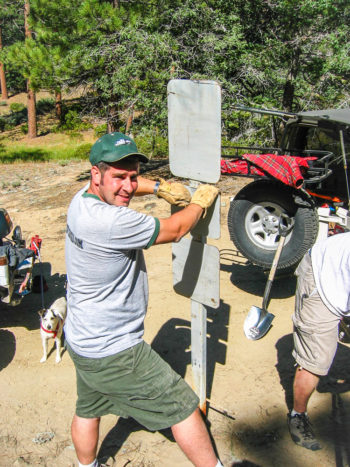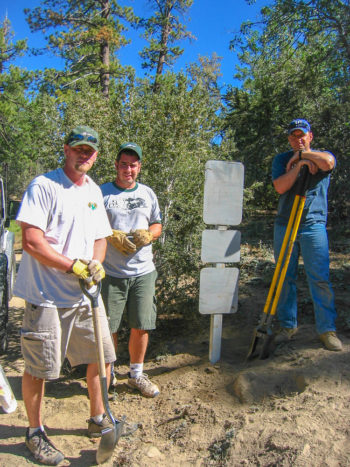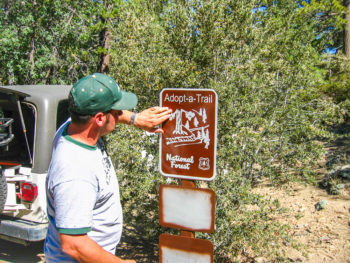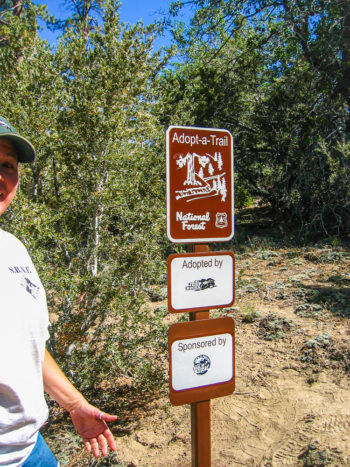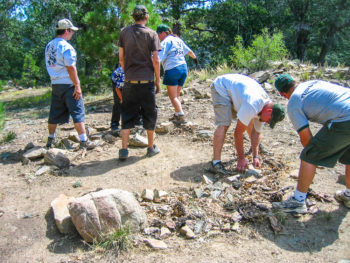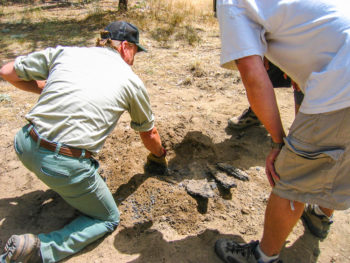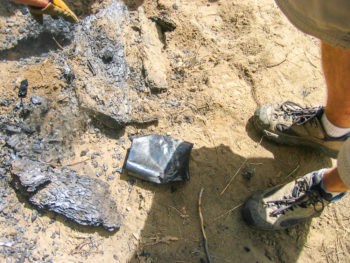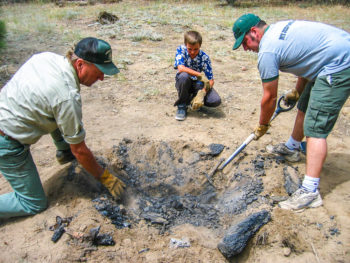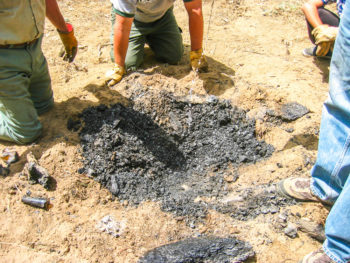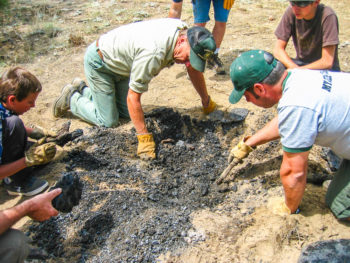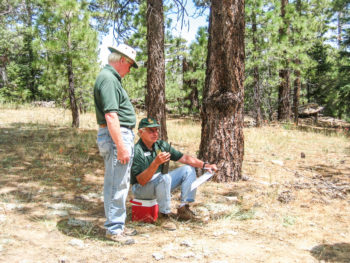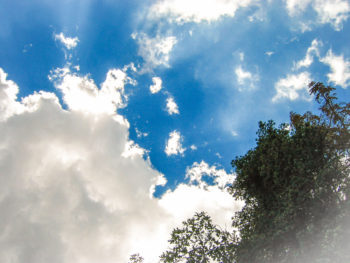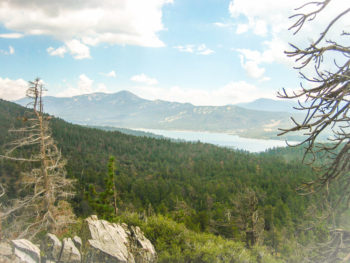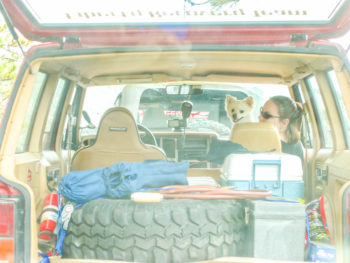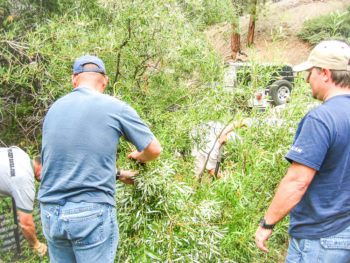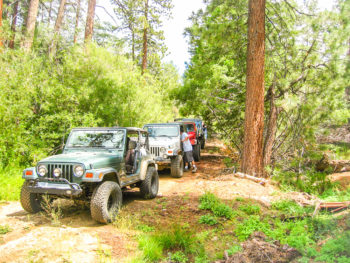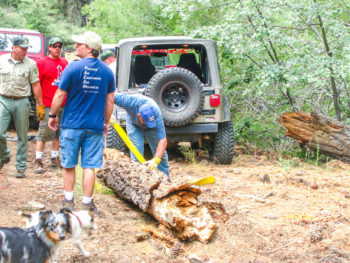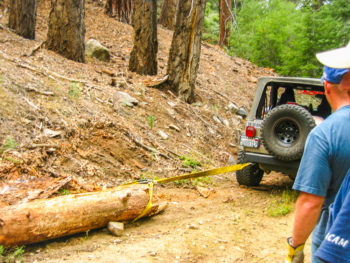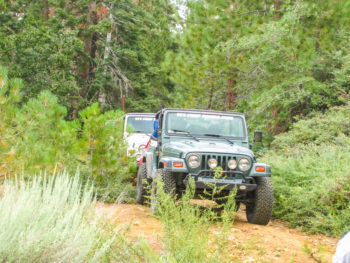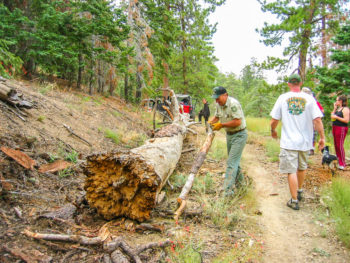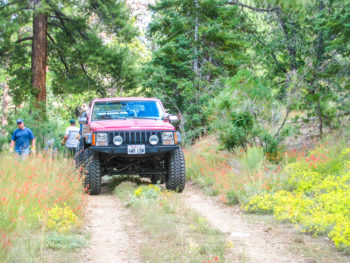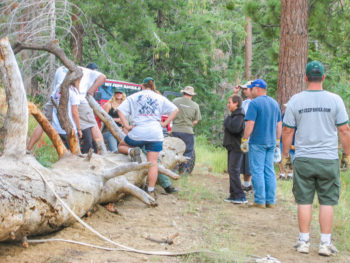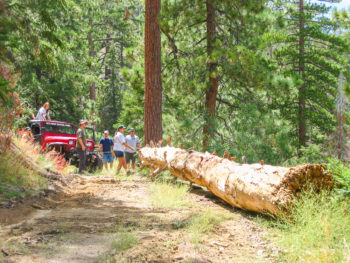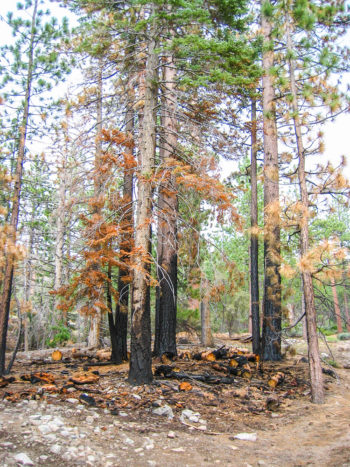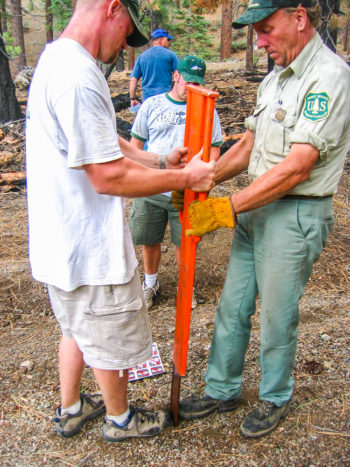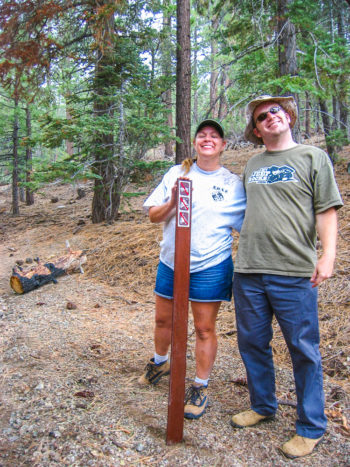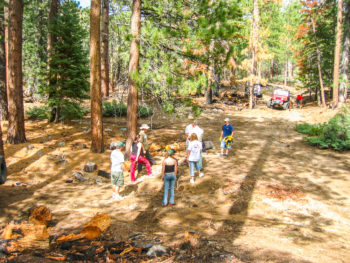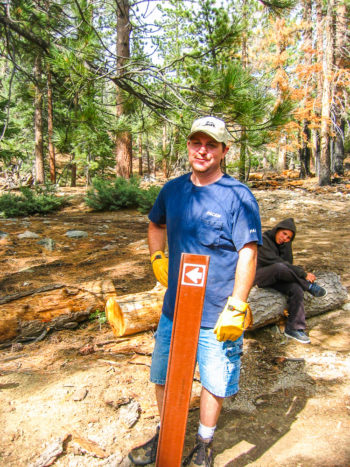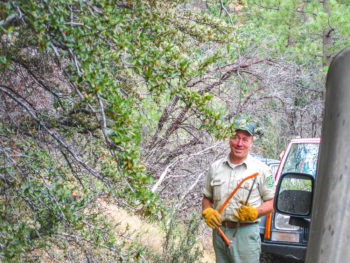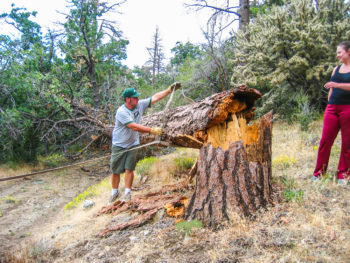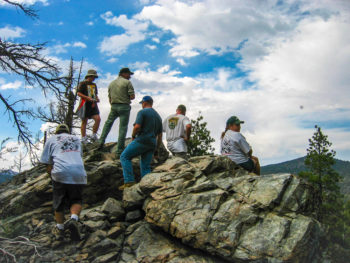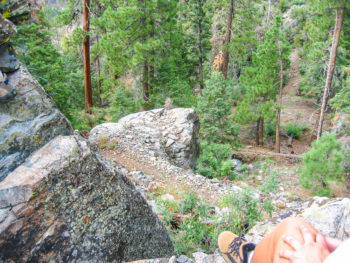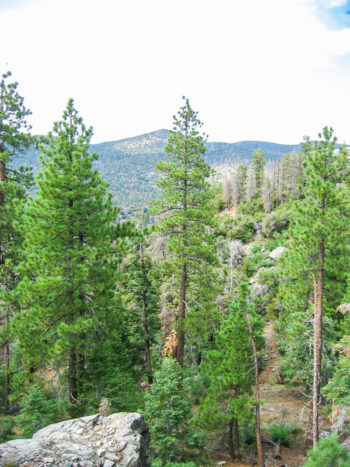Jeep Trail Reports
2N84 Work Party
Combined Hours: Over 120
Attendees: Sarah, Rick, Nick (clarksinca), Barb, Jason (loop choke), Bryan (kaffa), Erik (nailer341), Jeffrey, Chuck (cbremer), Erin, Gary (6spyder), Supe (TJSupe), Tammy (JeepGal), Christina, Chelsea
August 14, 2005:  Our first official 2N84 trail run as a group with Greg Hoffman was definitely extremely memorable. After leaving the Fawnskin fire station a little after 9AM, we headed to the trailhead to choose a spot for our new and official Adopt-A-Trail sign.
Our first official 2N84 trail run as a group with Greg Hoffman was definitely extremely memorable. After leaving the Fawnskin fire station a little after 9AM, we headed to the trailhead to choose a spot for our new and official Adopt-A-Trail sign.
While Rick, Nick, Gary, and Jason dug the sign hole, the rest of the group filled the top of a nearby big mack (drain) with small rocks. We learned that rocks disperse the energy of passing water, and protect the hill from erosion. Once both tasks were complete, Greg snapped a group picture next to the freshly painted sign.
We continued down the trail, turned on to 2N84A, and stopped near the yellow post campsite to cut and clear some brush. A little farther down the trail, we broke up a giant ring of rocks.
Greg noticed a dispersed campsite not much farther down the trail, which we all stopped to investigate. He believed it was suspicious that someone would camp in a dispersed site, so close to a yellow post. Upon entering the campsite area, everything seemed ok, until Bryan noticed a root beer can hanging from a far tree, full of bullet holes. The tree’s bark had been removed to form a rectangle around the can hanger, but was definitely not recent. The worst part was, both the tree and can overlook another trail in the near distance – a scary thought for other recreationists!
Another nearby tree also had bark damage, and we found several “pop” cans around the site. We obviously couldn’t say for sure that they were guilty of shooting, but Greg asked us how we could try to link the can and target to the site. We all decided that maybe there was a matching can in the trash. So with the others looking on, Tammy went rooting through the trash. Low and behold, under the table, behind the trash was the actual gun. Rick also found bullet shells and glass in what looked like an old fire ring, which he picked up and we carried out. Greg issued an incident notice, and left it in plain view on the table.
At this time we also learned that entering a private tent without permission is equivalent to breaking and entering, which most of us did not realize. (Not that we’d actually do it, of course!) We also learned how to properly issue a California campfire permit.
We were as giddy as kids in a candy shop at this point – we had seen and learned so much! We continued down the trail a bit further, not expecting much more action for a Sunday afternoon. Jason noticed an illegal trail heading to the left, and not too far from the road, fresh dirt was suspiciously piled. Greg was the first to the scene and began digging through the dirt pile. Soon enough he uncovered hot ash and coals, a fuel can, warped and half-melted bottles and other trash! We learned what a dangerous situation this really was: it is possible that underground roots may cross the embers and begin to burn underground, creating disastrous results if finally reaching the surface.
As the rest of the group finished clearing another illegal, but cold, fire ring a little farther out, everyone began to gather ’round for our next lesson. A couple of the OHV volunteers joined us at this point, Jim and Rex, the Grumps! Greg and Rick dug to the bottom of the black ash and formed a volcano-like shape … and most of you should know what’s coming next! Our new OHV friends poured water into the middle to make “soup” and stir the embers together, making sure all were wet and cool. After everything was mixed together, we felt the area for any hot spots, and made sure there were none. We then watched the proper OHV procedure for reporting an illegal campfire and receiving an incident number on the forest radios.
How to Properly Extinguish a Campfire
As demonstrated by Greg Hoffman (photos above)
- Feel around for hot coals.
- Remove large objects.
- Dig up all ashes and coals.
- Use water to cool the area.
- Form a volcano, fill with water.
- Stir until completely cooled.
- Report the incident.
We finished up by smoothing the ground where the illegal campfire was, and making it blend into its surroundings. We also learned how to mask an illegal trail using loose objects (rocks, pinecones, pine needles, logs) from the surrounding area. We made the area in front of the illegal road into a turnout, with all of us turning through it on the way up and back down the trail.
The “Grumpy Old Men” also joined us for our next adventure and highlight, Little Bear Peak. Before everyone could park and hike to the top, those pretty clouds turned into a localized thunderstorm hit. Jason quickly placed the geocache (more to come on that subject!) as we hurried to our Jeeps for cover. Our next destination was 2N84 – where the fun was just beginning!
We cleared an overgrown culvert, moved some small logs, and re-routed some drainage on the main trail.
Erik and Jason proceeded down the trail with Greg to get a look at the remaining things that needed to be done.
Greg pointed out an enormously huge tree, which we estimated to be about 50-feet long, on the left side of the trail. It was encroaching on the path just a bit. He asked if we thought we could do anything with it – of course, Erik and Jason say, “sure, we can get that stick off of the trail! No problem!”
We proceeded to look the monster over for the best plan of attack. We decided to join forces with the two jeeps, pull the tree onto the open trail, and then winch it over the edge.
We strapped Erik’s Jeep to it with his famous tow strap. Jason hooked his Jeep to the front of Erik’s and they pulled the giant tree onto the trail with the synchronized power of the vehicles.
To Greg’s surprise, we were able to bring the tree to an open area on the trail. There, we could plan exactly how it was going to be sent over the edge of the hill and completely out of the way.
The rest of the group proceeded to trim some limbs, as others began the safe and secure rigging of the winch line to some lower trees. Using a snatch block, we were able to direct the tree exactly where we wanted it to go. It was quite an undertaking to get it off of the trail with the equipment we were using. With some great teamwork and organization, we were able to safely get it off of the trail. This job could not have been done if it weren’t for the teamwork and organization of the group. Everyone worked together like a finely oiled machine.
There was always someone deemed “safety person” to see that all bystanders (and dogs) were safely out of the way whenever there was to be winching or any other movement of the tree. We celebrated for a moment before continuing down the trail for the next task at hand, which was to inspect the burn area.
As mentioned in our last trail report, a section of our trail had burned the first time we ran it. To help prevent this again, we installed new signs and covered the dead-end trail with some natural disguises to keep people out of this large “turnaround” area.
It was getting late, but the group unanimously decided to continue on. We heard that there was another tree down on the trail, and the guys couldn’t wait to get their winches on it, and clear another out of the way.
We pulled up to the scene, and yes, this tree was huge. Never will we forget the look on Greg’s face when he saw Erik back his Jeep up to the tree, and get out the strap. This was classic! Sure enough, they had to give it a try. This time they added Chuck’s Jeep to the congo line to make three. But this time, the tree didn’t budge. It didn’t even creak! We’re going to have to take the chainsaw certification class to get this one out of the way!
We all ended up walking the rest of the trail to see what else needed to be done. We stopped to look out over the Pacific Crest Trail that crosses at the bottom of the cliff towards the end of 2N84. Completely exhausted and starving our brains out, we decided to call it a day – a very productive day – and head our separate ways.

